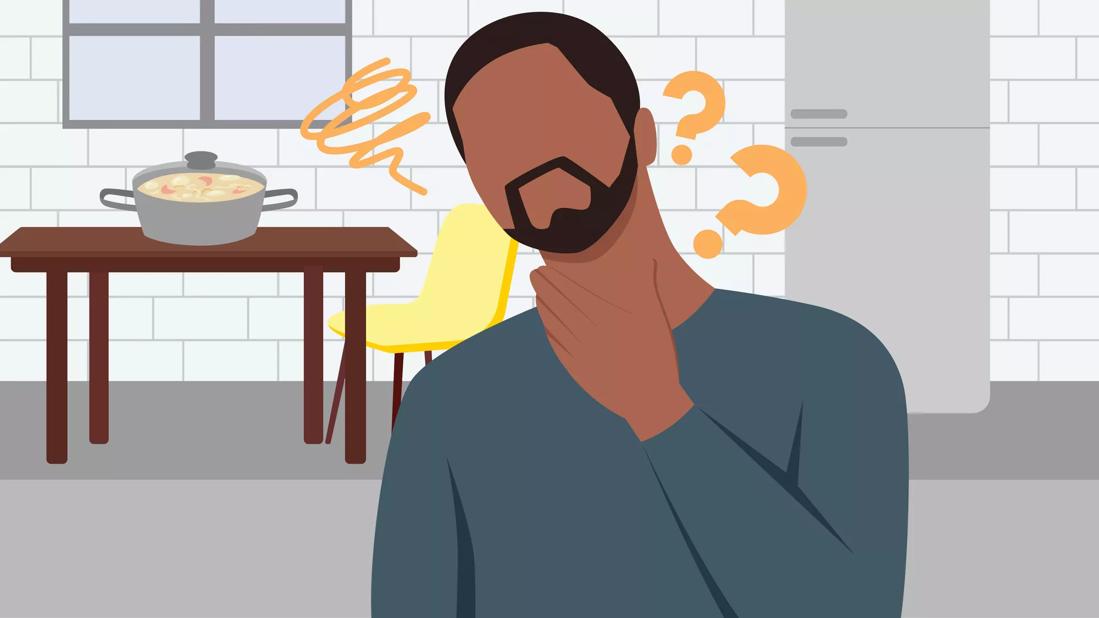From food impaction to acid reflux, when you feel like something is in your throat, it’s important to seek medical treatment

Feeling like something is stuck in your throat can be a miserable and sometimes scary experience. You’re not choking, but you don’t feel right either.
Advertisement
Cleveland Clinic is a non-profit academic medical center. Advertising on our site helps support our mission. We do not endorse non-Cleveland Clinic products or services. Policy
Maybe you can pinpoint something you ate that got stuck on the way down, like a piece of steak or hotdog, that’s making it hard to swallow. Or maybe the feeling has been plaguing you for months without any clear reason, causing you continual coughing and chronic irritation.
What gives? Gastroenterologist Christine Lee, MD, explains why you may feel like something is stuck in your throat — whether it’s a sudden, new feeling or one that’s been bugging you for a while — plus, how to make the feeling go away.
When it feels like something is stuck in your throat, it usually comes down to a few culprits:
Dr. Lee shares more about these causes, including how they feel, how they’re treated and what not to do if you think you’re experiencing them.
Dysphagia is the medical term for having difficulty swallowing. It can have several different causes, but a common one is having a piece of food stuck in your esophagus — the tube that carries food and liquid from your throat to your stomach.
Advertisement
Maybe you didn’t chew your steak well enough or didn’t realize there were bones in your fish. Next thing you know, you’re coughing and trying to clear your throat, but no matter how much you swallow or how much water you drink, the feeling that something is stuck in your throat just won’t go away. You can breathe, but your throat and chest hurt. And you may have a hard time swallowing your own saliva.
“Dysphagia from food impaction is typically uncomfortable and even painful,” Dr. Lee says, “and it can be dangerous, depending on what’s stuck and where.”
It’s important to know that food stuck in your esophagus can cause significant irritation, inflammation and erosion. For example, a piece of meat with spices or marinade on it that’s stuck for a prolonged amount of time can damage your esophageal lining.
What to do about it: “If you can’t swallow your own saliva, begin drooling, have shortness of breath or difficulty breathing, or have chest pains, you need to call 911,” stresses Dr. Lee.
But what if you’re dealing with a lesser form of food obstruction? She still warns against doing anything that could make it worse and encourages you to seek medical attention instead.
“If the food obstruction is mild, water or carbonated beverages might help ease the food down,” she says, “but be careful to not overdo it. If the obstruction is severe, you run the risk of adding to it.”
Another common cause of dysphagia is gastroesophageal reflux disease (GERD). This form of acid reflux causes the contents of your stomach to flow back up into your esophagus, which irritates the lining.
“This can cause a burning sensation in the throat and neck, coughing or a nagging feeling that something is stuck behind your breastbone,” Dr. Lee explains. “You might notice that eating certain things, like spicy, fried or fatty foods, makes your symptoms worse."
What to do about it: Antacids or over-the-counter medications like omeprazole or famotidine can help manage heartburn or indigestion.
But if your symptoms are chronic, it’s best to see a healthcare provider for an evaluation. A doctor will want to make sure your symptoms are really being caused by GERD.
Advertisement
Sometimes, you feel like something is stuck in your throat … but nothing is there. This may be globus sensation (also known as globus pharyngeus), the persistent feeling that something is in your throat or chest without a direct link back to what it could be.
“People with food obstruction can almost always identify what they ate that is now stuck in their esophagus,” Dr. Lee notes, “but with globus pharyngeus, most people describe the sensation as a lump that has been affecting their swallowing for weeks or months.”
People describe the sensation as more uncomfortable than painful. Some people describe it as feeling like they’ve swallowed a pill that’s only made it halfway down.
What are you most likely to do when you feel like something is constantly stuck in your throat? Naturally, you want to cough to try to clear it — but continual coughing can further irritate the lining of your throat or esophagus, causing even more irritation. It can be a vicious circle.
What to do about it: This lingering, annoying feeling may drive you to a healthcare provider’s office to try to figure out what’s going on — and that’s good because how globus pharyngeus is treated depends on what’s causing it.
If the sensation is in your throat, an otolaryngologist (aka, an ear, nose, and throat specialist, or ENT) will have to evaluate your throat and vocal cords to see if something is causing irritation or inflammation.
Advertisement
“Sometimes, it’s a tiny fishbone causing the irritation,” Dr. Lee says, “and sometimes, it can be the least suspecting item. Once, we even found a teeny piece of aluminum foil stuck in someone’s esophagus.”
When the cause has been identified, it can be removed.
Let’s say you’ve visited a healthcare provider and they don’t find anything obvious that’s causing the lump-in-your-throat feeling. Now what?
Other conditions that can cause the feeling that something is stuck in your throat include:
“If we’ve proven that there’s nothing there, we’ll look for signs of other conditions,” Dr. Lee says. “We’ll even consider the environment. Is the air cold and dry? Is it peak pollen season?”
Whether it comes on suddenly and you know the cause, or it creeps up over time without any explanation, Dr. Lee again stresses that you should be seen by a healthcare provider, even if you feel tempted to first address it on your own.
Importantly, she cautions against most so-called home remedies, warning that you risk making the condition worse — and you may even risk an esophageal tear, which is a medical emergency.
Advertisement
“If something is bothering you, it may be your body’s way of telling you something’s not right,” she says. “It’s always best to have it checked out.”

Sign up for our Health Essentials emails for expert guidance on nutrition, fitness, sleep, skin care and more.
Learn more about our editorial process.
Advertisement

Often, a throat tickle is due to a cold, allergies or GERD — but see a doctor if it won’t go away

Most oropharyngeal cancers can be traced to a virus that can be shared during oral sex

Honey can help make a sore throat more bearable by tamping down inflammation and coating your throat

If you have other cold and flu symptoms, it’s probably not strep

From hot showers to hot tea, there are many ways to relieve sore throat inflammation and pain at home

Forceful vomiting and stomach acid in your esophagus can cause a sore throat that lasts days or even weeks

Voice rehabilitation and technological devices are helpful tools for voice recovery

Change your toothbrush after an infection and always take your full course of antibiotics to help ward off recurrence

Even small moments of time outdoors can help reduce stress, boost mood and restore a sense of calm

A correct prescription helps your eyes see clearly — but as natural changes occur, you may need stronger or different eyeglasses

Both are medical emergencies, but they are very distinct events with different causes